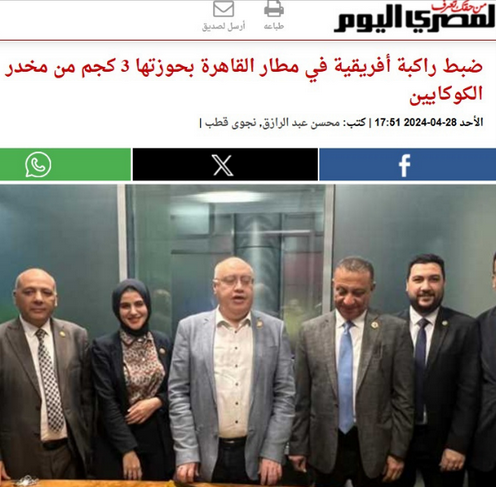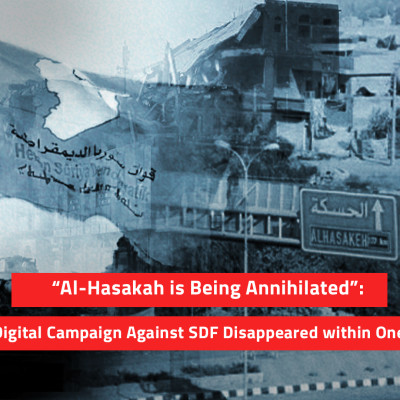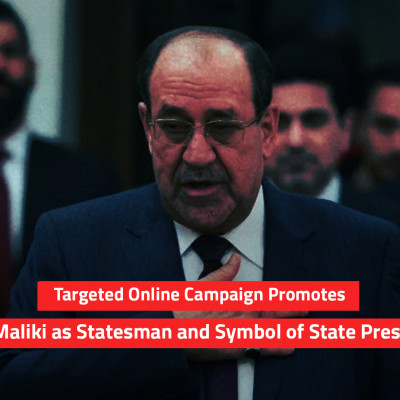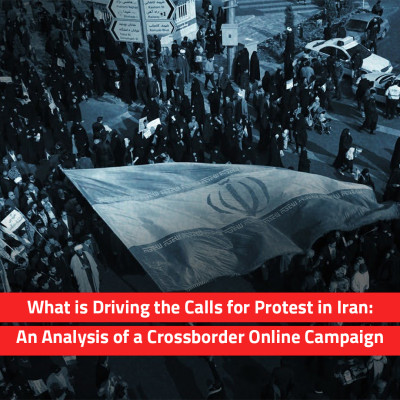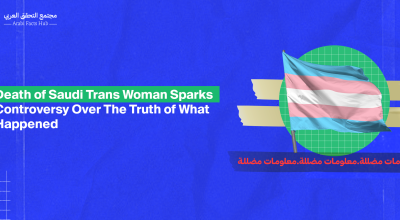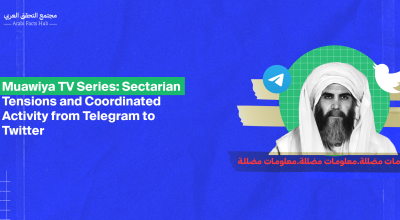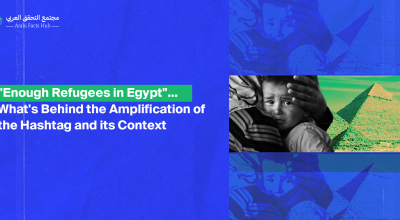Egypt: Asylum Bill Sparks Coordinated Digital Hostility Against Refugees
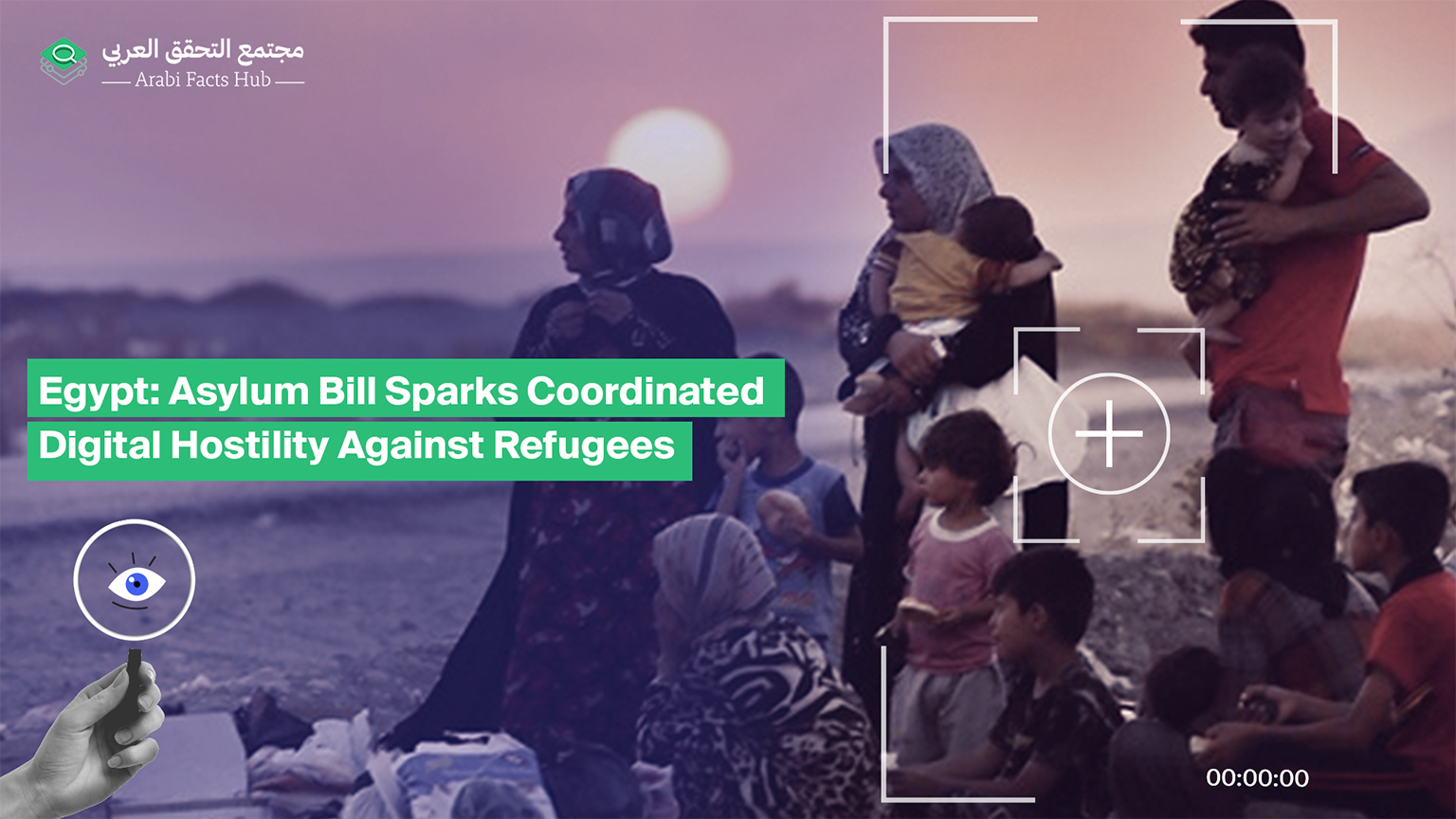
Organized hate speech in association with Alsylum law project
On November 17, 2024, the Egyptian House of Representatives approved in principle a draft law submitted by the government to issue an asylum law for foreigners. Under the draft law, a specialized government committee is to be formed to work on the "legal regulation of refugee statuses." Individuals granted refugee status would receive a travel document and be protected from being extradited to their country or place of residence. They would also be entitled to rights including work, education, litigation, and the possibility of obtaining Egyptian citizenship.
However, the law prohibits engagement in politics or unions, as well as participation in hostile acts against any other countries, including the refugee’s country of origin, or involvement in activities that might harm national security or public order.
The debate over the draft law coincided with an online campaign targeting refugees, calling for their deportation and rejecting the proposed law.
”
Anti-refugee rhetoric found its way to X through at least eight hashtags, including: #ضد_قانون_اللاجئين (Against Refugee Law), #ارفض_قانون_التوطين (Reject Resettlement Law), #البرلمان_لا_يمثلني (Parliament Does Not Represent Me), #ضد_قانون_التوطين (Against Resettlement Law), #ترحيل_جميع_اللاجئين_مطلب_شعبي (Deporting All Refugees Is A Popular Demand), #ضد_توطين_وتجنيس_اللاجئين (Against Refugee Resettlement and Naturalization), and #ضد_قانون_التوطين_في_مصر (Against Resettlement Laws in Egypt).
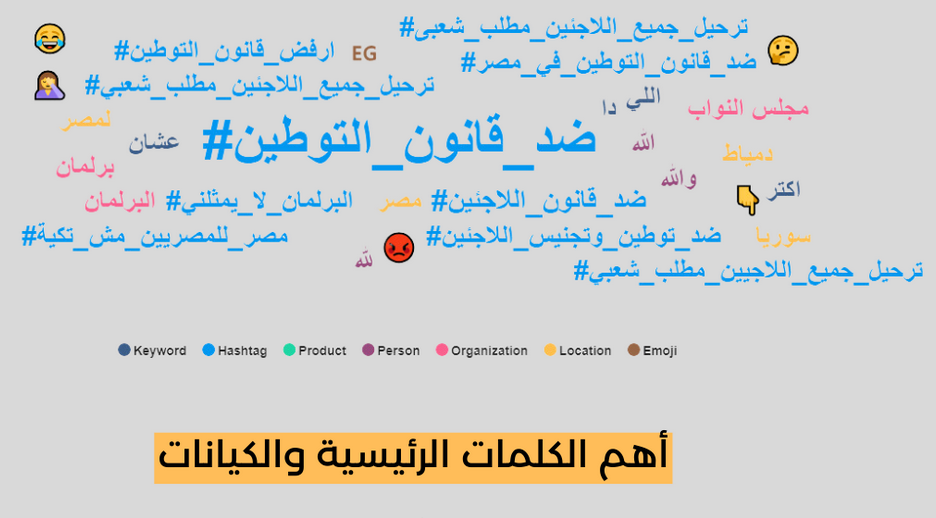
Word Cloud of the Most Prominent Hashtags on the Asylum Law Bill – Meltwater
Between November 10 and 23, 2024, the hashtags collectively featured over 86,000 posts, which were viewed at least 7.115 million times and potentially reached 13 million accounts, according to Meltwater, a leading social media content analysis tool.
The hashtags generated more than 287,000 interactions (likes, retweets, replies, and comments). They peaked in popularity twice during the activity period: the first on November 12, 2024, driven by at least 10,000 posts on that day alone, and the second on November 17, with 15,000 posts.
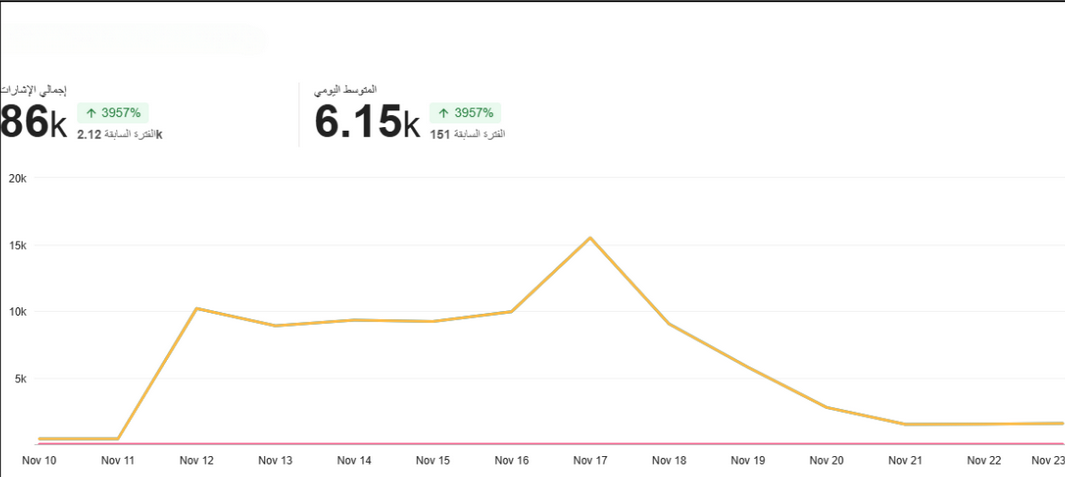
Periods of Activity for Hashtags Opposing the Asylum Law Bill in Egypt – Meltwater
Nationalist Accounts and Groups
The campaign relied on groups known for their anti-refugee stances, and accounts—including some belonging to writers—that frequently propagate the same narrative about the law, viewing it as a threat to national sovereignty and the fabric of Egyptian society. They also attribute economic decline and job losses for Egyptians to the presence of refugees.
Prominent nationalist accounts and groups emerged within the wave of posts observed during the campaign, involving a total of 8,815 accounts during the specified time frame. The content of these accounts reveals a focus on mobilization and creating a hostile climate toward foreigners and refugees. Their profile descriptions often emphasize nationalist rhetoric, highlighting the superiority of Egyptian ethnicity and featuring symbols and images of ancient Egyptian artifacts and figures to reinforce their identity.
Posts from some of these accounts received significant engagement and widespread reach through the campaign hashtags, reflecting their influence. This was bolstered by their large follower bases, often numbering in the tens of thousands. Among the most notable accounts are:
@Egeptland, @sherinhelal555, @YasserH00839888, @hindElshawafو @hanasorour1409, @hanna_ameen85, @Egeptland, @YasserH00839888, @_rame7, @MrKandiel, @shamss_masr, @HalaAbdalwhab, @Nany_se34157307, @SecuEgy, @JoK4Y0KPoPAdTm3, @hayatabdelatif, @EgAncient, @maggyalitahon, @Masri010, @tahoun71, @farahfaroha1012, @abdelwahab_mona, @VOmaryonn, @7rbyforever, @Fatma18236032, @dodo_m_ali.
Sherine Hilal, a writer and researcher who publishes her articles in government publications, and the Russian "Realist" agency, emerged as one of the most prominent participants in the campaign on X. Hilal has a long history of launching and participating in anti-refugee campaigns and advocating for their expulsion from Egypt, including her previous involvement in the #مقاطعة_محلات_السوريين (Boycott Syrian Stores) campaign.
Sherine Hilal received widespread engagement during the campaign, with 33 of her posts ranking among the top 100 most interactive ones. According to Meltwater data, approximately 16,000 posts published by 3,102 accounts were linked to her content through the campaign's hashtags.
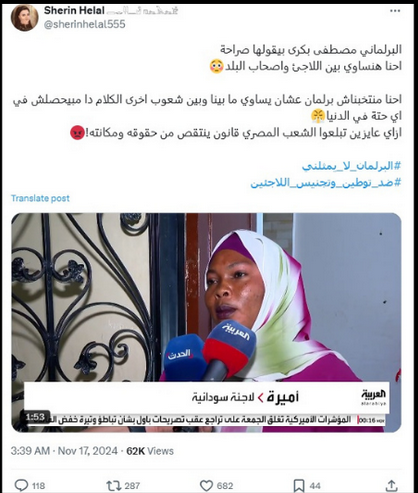
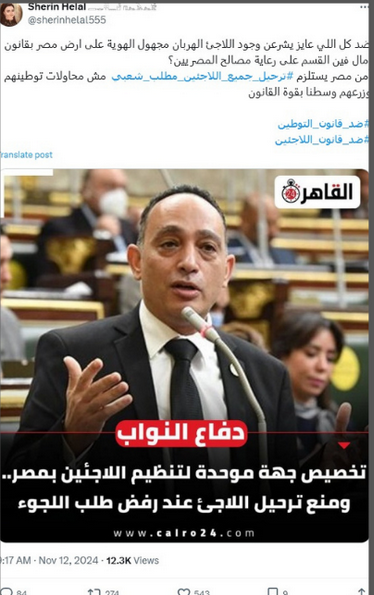

Since its creation in June 2017, the account @Egeptland has dedicated its efforts to opposing refugees, targeting them through selective and negative posts.
The account, which states “My cause is expelling refugees from Egypt and cleansing its land,” has published more than 17,600 posts focused on this issue. During the recent campaign, its posts on hashtags such as #ضد_قانون_اللاجئين (Against Refugee Law), #ضد_قانون_التوطين (Against Resettlement Law), #ضد_توطين_وتجنيس_اللاجئين (Against Refugee Resettlement and Naturalization), and #ترحيل_جميع_اللاجئين_مطلب_شعبي (Deport All Refugees Is a Popular Demand) contributed to generating 5,054 related posts, written by 1,397 accounts.

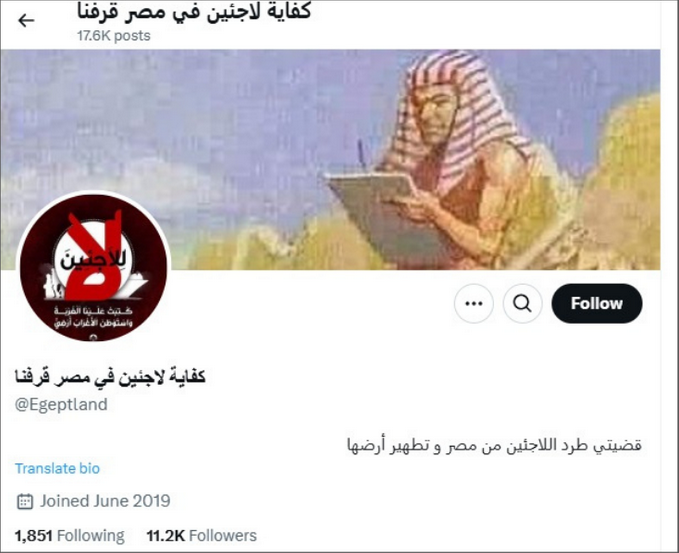
The campaign attracted accounts that had previously participated in online campaigns expressing support for the Egyptian president, including YouTuber Mohamed Kandil. Kandil owns multiple social media accounts, with 272,000 followers on his Facebook page and 33,000 on X. He has a YouTube channel with 568,000 subscribers, and the total views of his videos exceed 203 million. According to SocialBalde, his channel's potential monthly earnings are estimated to range between $363 and $5,800. In his posts on the hashtags, Kandil called for the rejection of the draft asylum law and expressed his opposition to what he referred to as "their resettlement" or the granting of facilitations. Other accounts repeated the same rhetoric on X.
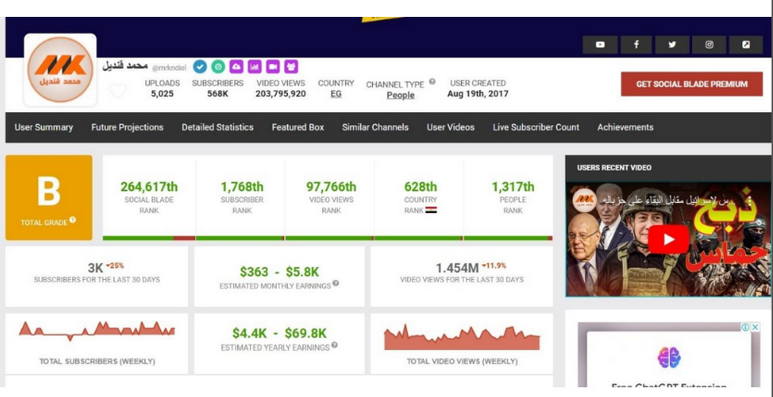
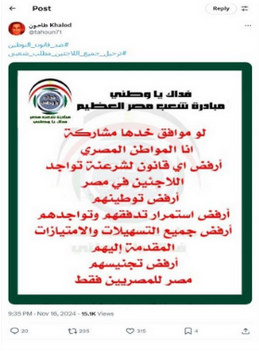
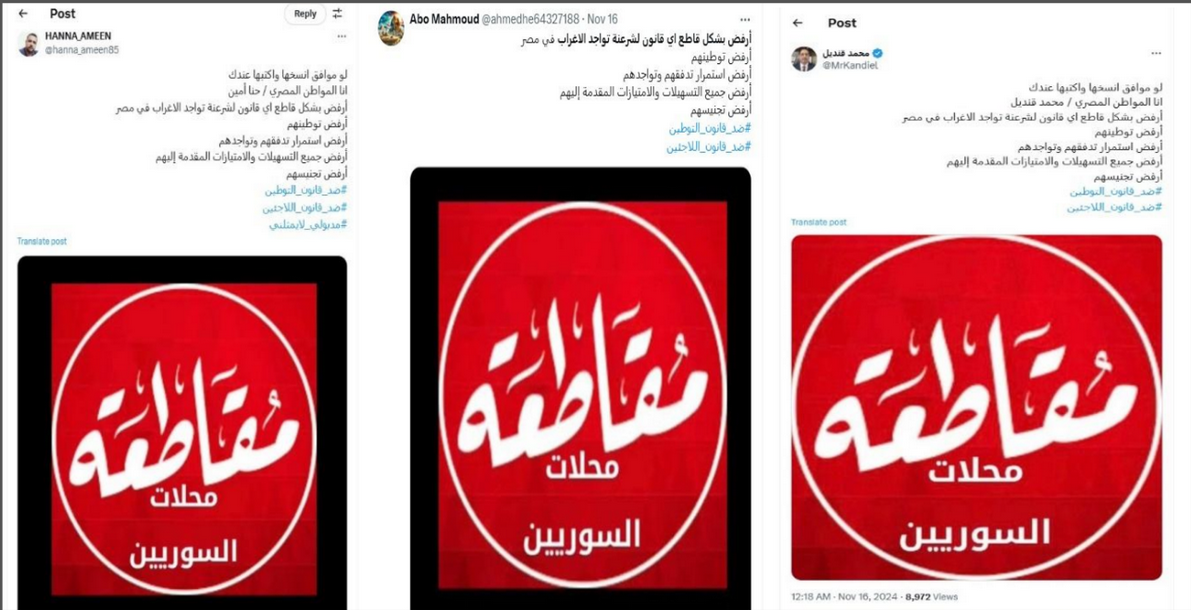
”
The momentum of the debate over the law has extended to Facebook groups playing a role in political propaganda for official stances, such as the group "Egyptian Alliance for Social Media Communication". Some of its administrators have previously appeared at events attended by the president.
For example, Amani Abdelaziz, one of the group's administrators, expressed her opposition to the law by stating that she rejects "the refugee law," asserting that the House of Representatives does not represent her and describing the statements made by government officials regarding the law as "provocative."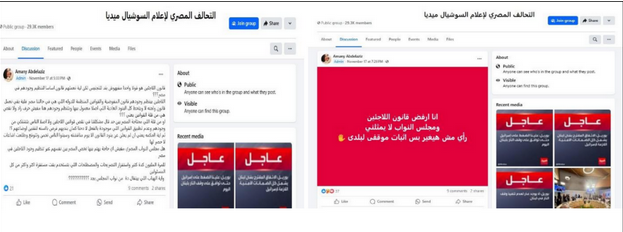
While nationalist anti-refugee pages have reduced their activity on X over the past few months, some of them continued to engage with the debate surrounding the draft law, but on Facebook. Of the most prominent of these pages is "The Republic of Refugees," which is a strong and active group attacking refugees. In one of its posts commenting on the law, it wrote: "Congratulations, everyone, the era of foreign privileges and occupation has returned, but under new guise from a government that calls itself patriotic!!! No condolences for the Egyptian citizen."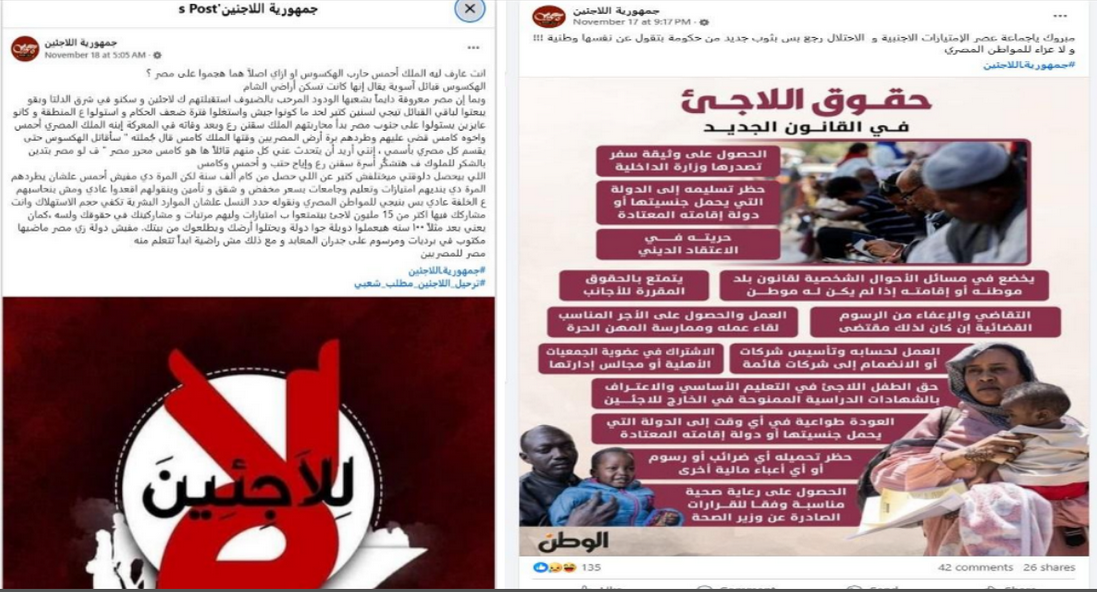
Hate Speech and Misinformation
An analysis of sentiment trends, based on Meltwater data, reveals that negative impressions dominated the campaign's hashtag content, accounting for 81%—equivalent to 69,600 posts. In contrast, the proportion of positive sentiment was limited to just 3.4%, or about 2,900 posts.
Regarding the type of posts, Meltwater data showed that restweets made up 62.4% of the total, amounting to 53,600 posts. Meanwhile, original posts directly published by accounts totaled 3,800 posts (4.5%), while responses accounted for 20,000 posts, representing 23.3%.
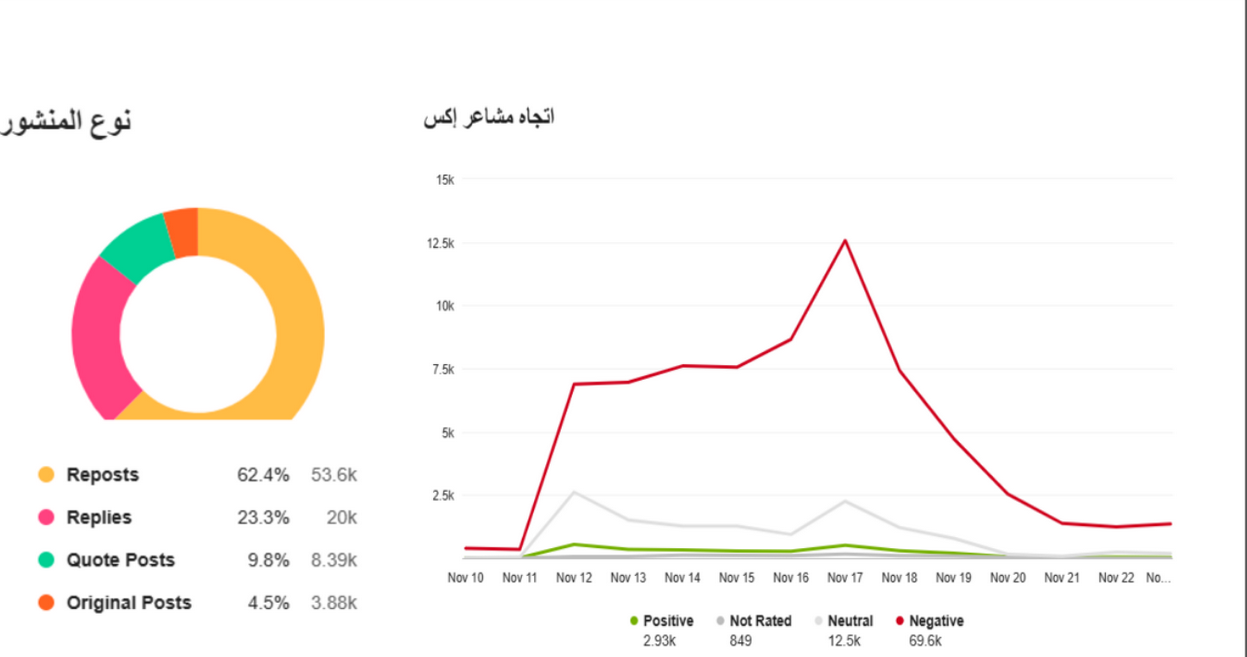
Repeated posts placed the blame on refugees for the worsening economic conditions and the decline in public services in the country. Participants in the campaign used language that falls under hate speech and dehumanization, including animal references, such as: “chimpanzees”, “zourians” (referring to Syrians, implying they are frauds), “shoesanese” (Sudanese), "scum," and "good for nothings."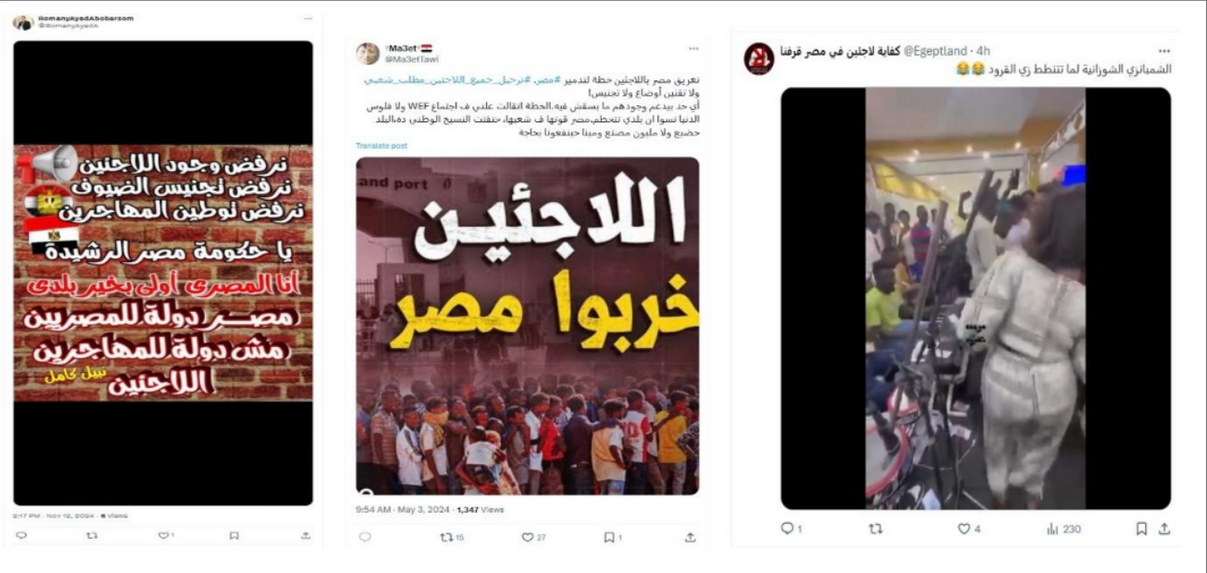
In addition to phrases likely to fuel resentment against refugees, the following were circulated:
– “The occupation government led by Madbouly and his leader decided to humiliate Egyptians and hand over Egypt to the scum of the earth experienced in civil wars. It’s no longer just resettlement; now it has become empowerment.”
– “Sometimes I feel like Egypt has turned from being a country into an open buffet for anyone who wants anything! Want to buy land? Come. Want to resettle refugees? Here a go. Want history? We have it. And of course, Egypt has nothing to do with it—it’s the fault of those who turned Egypt into this, whether intentionally or ignorantly, though most likely intentionally!”
– “Egypt at this very moment has already lost Damietta, Faisal Street, Ard El Lewa, October, and Aswan. If we remain silent, we’ll become slaves on our own land. The economic situation is getting worse every day—crises, rising prices, inflation, with subsidies being lifted. We said we would endure for our country, but when we see the government spending $10 billion annually on 10 million refugees and even making a law to resettle them, it’s too much.”
Accounts involved in the campaign selectively shared negative news about refugees and shared context-less videos with the aim of discrediting and inciting negative emotions against migrants.
For instance, the accounts Nany_se34157307@ and @ramyi288 shared a video, claiming it was linked to Sudanese refugees in Egypt, with a caption stating: “What are you waiting for to deport them and clean up our country? Enough of this mess... They are the ones taking Egyptians’ place in housing, universities, jobs, and aid…”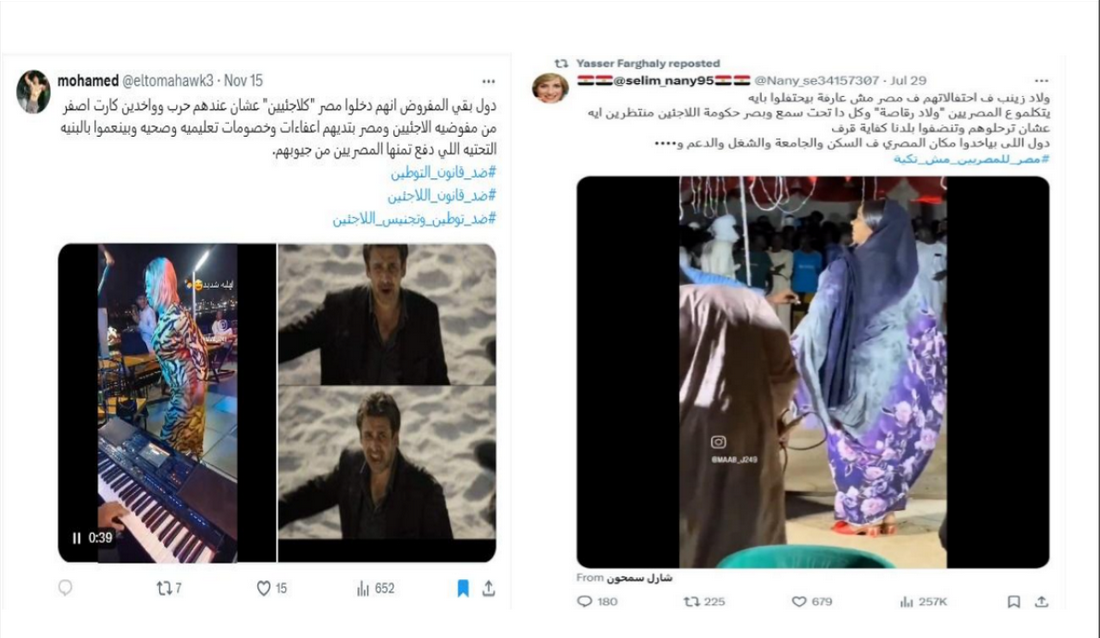
Some accounts began reposting old news from years ago related to refugees of various nationalities, including reports about poisoning incidents in which some Syrian restaurants were accused of being involved.

The repeated posts contained misleading information, relying on news and videos taken out of context. One of the most notable videos claimed that “a Sudanese investor was arrested at the airport on charges of bringing drugs into Egypt in secret compartments in her luggage.” However, upon verifying the video, it was found to date back to April 2024 when Egyptian customs authorities at Cairo Airport arrested “an African passenger”—who reports indicated was coming from Addis Ababa on an Ethiopian Airlines flight. At the time, news reports, such as those on Al-Masry Al-Youm, did not mention any details regarding the passenger’s nationality, nor was it indicated that she was Sudanese.

